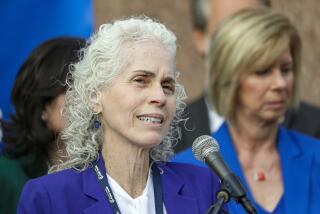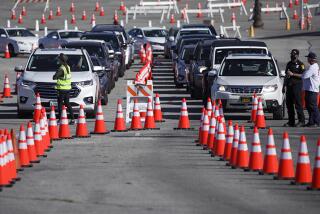You may be ready for bar-hopping, but I’m not ‘reopening’ yet
- Share via
The undergrad who lives in the back room keeps trying to get me to rejoin the world.
“Let’s get coffee,” she suggests one day. “Let’s take a drive to Santa Monica,” she suggests the next.
For the record:
7:44 p.m. June 23, 2020A previous version of this article said that Ahmaud Arbery was killed by police. He was killed in a confrontation with two armed citizens.
At 21, my daughter is long past ready to restart her life. She’s been living at home since March 13, when her mother and I picked her up at LAX. The three of us went into isolation that afternoon, and she has had enough.
I have not. I am against reopening. I’m still hunkered down. Not forever, but for now. The pandemic isn’t over, and in fact, the numbers suggest it is getting worse — again.
According to the COVID Tracking Project, cases are rising precipitously in Texas, Arizona and Florida. Reuters analyzed the project data and found a 90% increase in week-to-week new cases in Arizona, and about 80% in Texas and Florida, as of June 21. In California, the number of confirmed cases keeps increasing, with Los Angeles still a hot spot, and statewide, hospitalizations, which were somewhat steady, are also climbing.
Dr. Anthony Fauci, and just about every public health officer, epidemiologist and respiratory specialist in the country, is uneasy. “People keep talking about a second wave,” he said recently. “We’re still in a first wave.”
Data analysis by the Institute for Health Metrics and Evaluation at the University of Washington projects a total of more than 200,000 COVID deaths in the United States by the beginning of October. And yet a whole lot of us appear to have come to a collective reckoning that three-plus months of being careful is enough.
The Onion evoked the absurdity of the moment with a parody news item announcing that Dallas had entered Phase 4 “of completely deluding ourselves into thinking that this pandemic has somehow stopped spreading and that we’re safe.”
In California, aside from sports, live performances and conventions, just about everything has at least partly reopened. Over the last few weeks, we have seen the return of in-restaurant dining and limited access to retail outlets, bars and gyms. Houses of worship can now host services for 100 congregants or less.
The logic is that mandatory face coverings and social distancing will keep us safe — or, at least, safe enough. But as Luke Money, Hannah Fry, Stephanie Lai and Rong Gong Lin II recently reported, “a mask rebellion is underway in some parts of the state.” (Anecdotally speaking, based on the walks I take most mornings, I’d say the rebellion is everywhere.)
Then, of course, there’s the Trump administration’s reckless approach to COVID-19. It’s possible that the president’s so-called campaign restart in Tulsa, Okla., was so sparsely attended because there is at least one thing I have in common with some of his voters: I’m not ready to reopen. He chose to go ahead with the next rally, in Arizona, where about 3,000 of his supporters filled the Dream City Church and hooted at the notion that masks were necessary.
The argument for reopening comes framed, largely, as a matter of economics — and why not? Since March, more than 44 million Americans have filed unemployment claims. The financial effects of COVID-19 have been devastating, especially for the most vulnerable: low-income families, communities of color, small businesses.
Not unlike the institutionalized racism embodied by the killings of George Floyd, Ahmaud Arbery and Breonna Taylor, among so many others — or, for that matter, the coronavirus’ toll in the U.S. — this is a pandemic of another sort.
And yet, what happens if we go back too quickly? The effect could be more ruinous.
“Another round of shutdowns might have even larger effects on businesses that may be on the edge of not being able to stay solvent,” Dr. Christopher Murray, an expert on the burden of disease around the world, told CNN. The most effective economic strategy for the short term, in other words, may be to support our local businesses from home.
Look, I know I’m fortunate. Thus far, I’ve been able to work from home. I never went to the movies all that much, or to the gym, and I can’t remember when last I set foot in a synagogue, mosque or church. Thus far, my version of reopening has been to set out earlier on my masked walks, to avoid the increased traffic on the streets.
Until all the lines on the graphs stay level, or we get fast and accurate testing and tracking, we’re stuck. Humans aren’t setting the agenda here, the virus is. That may not thrill the undergrad who lives in the back room. It doesn’t thrill me. But reopening too quickly is not just irresponsible, it’s societal malpractice. As I finished writing the count was 187,349 cases in California, 5,577 deaths.
And still on the rise.
David L. Ulin is a contributing writer to Opinion.
More to Read
A cure for the common opinion
Get thought-provoking perspectives with our weekly newsletter.
You may occasionally receive promotional content from the Los Angeles Times.









